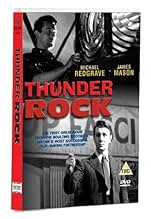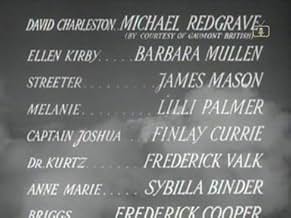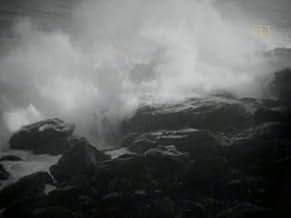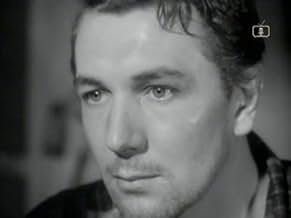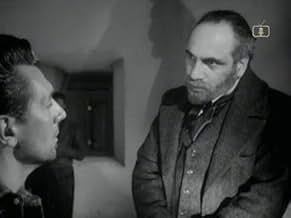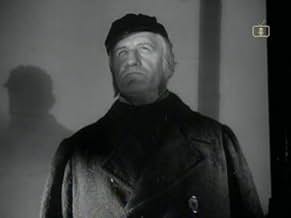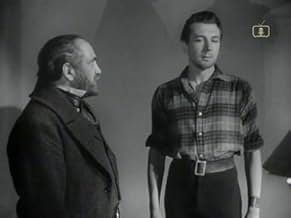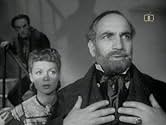Aggiungi una trama nella tua linguaCynical, embittered newspaperman David Charleston (Michael Redgrave) is tormented, then inspired, by visions he keeps having of people who have drowned.Cynical, embittered newspaperman David Charleston (Michael Redgrave) is tormented, then inspired, by visions he keeps having of people who have drowned.Cynical, embittered newspaperman David Charleston (Michael Redgrave) is tormented, then inspired, by visions he keeps having of people who have drowned.
- Regia
- Sceneggiatura
- Star
- Premi
- 1 vittoria in totale
Bryan Herbert
- Flanning
- (as Brian Herbert)
Recensioni in evidenza
First of all, THUNDER ROCK is a psychological drama, but the film has very much hidden beneath its surface. This film comes disguised as a rather peculiar fantasy tale, but the truth is that it deals with reincarnation, a fact that's already revealed in the first scenes: A message is passed on by telephone from one office clerk to another, and to another and another. Like knowledge that is transmitted from one life to another.
David (Michael Redgrave) who is living completely on his own in a secluded lighthouse, finds a logbook with an old passenger list. This allows him to tune into his subconscious mind to open up the memories of his past lives. The drowned people, "immigrants from the old world": Each one of them represents a part of David's character. Each one of them could have been a person he once was in a former life. If you believe in reincarnation, this is a film you must see. However, Michael Redgrave is superb and so is the rest of the cast in this beautifully photographed film classic.
David (Michael Redgrave) who is living completely on his own in a secluded lighthouse, finds a logbook with an old passenger list. This allows him to tune into his subconscious mind to open up the memories of his past lives. The drowned people, "immigrants from the old world": Each one of them represents a part of David's character. Each one of them could have been a person he once was in a former life. If you believe in reincarnation, this is a film you must see. However, Michael Redgrave is superb and so is the rest of the cast in this beautifully photographed film classic.
All the reviewers who wished they could see this film again (some of whom saw it originally in 1942!), can now see it again if they are resident British and subscribe to Freeview tv on Channel 81 It is shown regularly on this wonderful channel which I constantly watch if you can put up with the adverts which finances it, as it saves paying for numerous dvds which I used to do before I discovered this tv station.For example, every Sunday @ 9.p.m. GMT they are repeating the wonderful mid 60s episodes of "The Human Jungle" starring Herbert Lom which I originally saw when it was transmitted (I am now 72).
Some reviewers thought Thunder Rock was too stagey.Does it matter? I saw the classic R.C.Sherriff's "Journey's End" on Youtube the other day which of course is based on his play.What if Michael Redgrave is a bit declamatory at times, he was an accomplished stage actor first.In 1942 Britain was in a precarious position so of course the Government sought propaganda films to help morale & the war effort.See this film on the aforesaid channel, the tv station is bound to repeat it occasionally.
Some reviewers thought Thunder Rock was too stagey.Does it matter? I saw the classic R.C.Sherriff's "Journey's End" on Youtube the other day which of course is based on his play.What if Michael Redgrave is a bit declamatory at times, he was an accomplished stage actor first.In 1942 Britain was in a precarious position so of course the Government sought propaganda films to help morale & the war effort.See this film on the aforesaid channel, the tv station is bound to repeat it occasionally.
Charleston (Redgrave) lives in self-inflicted isolation as a lighthouse keeper, having become completely disenchanted with the outside world, most of which is complacent in the face of rising evil and looming war. In a dialogue with spirits of the past, he re-evaluates his decision to isolate himself.
Robert Ardrey's 1939 play railed against the widespread complacency at the rise of fascism, and anticipated WWII. That the play flopped in New York on first release and yet did well in wartime London a little later says plenty about how receptive the audience was to the message. In this film adaptation the story is broadened and filled in; it played to packed houses in 1943 America and did well in the UK.
Here the Boulting brothers -perhaps better known for their later comedies- have made an excellent film that is both absorbing and intriguing.
Of course it was made in wartime and the message is played for all it is worth as propaganda. But that doesn't make this film any less interesting or thought provoking. It is a little less overtly metaphysical than some other films from around this time and that is no bad thing; one foot is kept grounded at all times, more or less.
Someone once said "the greatest journeys we go on are those in our own minds" -or words to that effect- and this play/film is testimony to that.
The message that came through most strongly for me was that we owe the past a heavy debt; it is, in the present, always our obligation not to turn away, not to give up or hide away in the face of adversity.
Despite its flaws this film rates a 9/10 from me.
Robert Ardrey's 1939 play railed against the widespread complacency at the rise of fascism, and anticipated WWII. That the play flopped in New York on first release and yet did well in wartime London a little later says plenty about how receptive the audience was to the message. In this film adaptation the story is broadened and filled in; it played to packed houses in 1943 America and did well in the UK.
Here the Boulting brothers -perhaps better known for their later comedies- have made an excellent film that is both absorbing and intriguing.
Of course it was made in wartime and the message is played for all it is worth as propaganda. But that doesn't make this film any less interesting or thought provoking. It is a little less overtly metaphysical than some other films from around this time and that is no bad thing; one foot is kept grounded at all times, more or less.
Someone once said "the greatest journeys we go on are those in our own minds" -or words to that effect- and this play/film is testimony to that.
The message that came through most strongly for me was that we owe the past a heavy debt; it is, in the present, always our obligation not to turn away, not to give up or hide away in the face of adversity.
Despite its flaws this film rates a 9/10 from me.
I saw this movie in 1942, when I worked for the War Department and had just enlisted in the Army Air Corps, so this might account for the strong memories I have of it.
I was a little shocked that it seemed almost pure propaganda. However, it was clearly made for a British audience at a time when the nation was in imminent danger of invasion by the Nazis. Its message was never to give up hope.
It opens with the hero being frightened by the spread of Fascism across Europe. He goes into a London movie house where the depressing newsreel is followed by a cartoon which the unthinking audience finds hilarious. Disgusted, he gives up and withdraws into himself. He becomes a sort of hermit and somehow gets a job as a lighthouse-keeper on the Great Lakes.
Browsing through the lighthouse's log, he finds an account of a shipwreck. As he reads, the viewer notices that the lighthouse's central pole is now at an angle--a very clever hint of the transition to the fantasy now taking place. He is now on board the sinking ship and all is confusion and despair. But it turns out OK--the first example of the message (to the English) not to give up hope.
There are several other such episodes including one about the doctor in Vienna who discovers that doctors not washing their hands is how the deadly childbirth fever infection is spread. A failure, he is laughed out of town. But a few years later his radical theory is proved correct. Another morale boost for the discouraged wartime English.
I can't remember how the movie ends--but I've never forgotten the movie!
I was a little shocked that it seemed almost pure propaganda. However, it was clearly made for a British audience at a time when the nation was in imminent danger of invasion by the Nazis. Its message was never to give up hope.
It opens with the hero being frightened by the spread of Fascism across Europe. He goes into a London movie house where the depressing newsreel is followed by a cartoon which the unthinking audience finds hilarious. Disgusted, he gives up and withdraws into himself. He becomes a sort of hermit and somehow gets a job as a lighthouse-keeper on the Great Lakes.
Browsing through the lighthouse's log, he finds an account of a shipwreck. As he reads, the viewer notices that the lighthouse's central pole is now at an angle--a very clever hint of the transition to the fantasy now taking place. He is now on board the sinking ship and all is confusion and despair. But it turns out OK--the first example of the message (to the English) not to give up hope.
There are several other such episodes including one about the doctor in Vienna who discovers that doctors not washing their hands is how the deadly childbirth fever infection is spread. A failure, he is laughed out of town. But a few years later his radical theory is proved correct. Another morale boost for the discouraged wartime English.
I can't remember how the movie ends--but I've never forgotten the movie!
Based on a play, "Thunder Rock" is a 1942 film that follows the fascination with ghosts that seems prevalent at the time, just as it is prevalent in ours. There was "Between Two Worlds," which was the remake of "Outward Bound," "The Ghost and Mrs. Muir," "Heaven Can Wait," "Here Comes Mr. Jordan," - etc.! I won't go into the angels - "It's a Wonderful Life," "The Bishop's Wife," etc. The war caused people to think about death and the afterlife a great deal.
"Thunder Rock" is about a newspaperman David Charleston, (Michael Redgrave) who saw the rise of Fascism and Nazism and tried to warn people to wake up and take action. Unfortunately, his editors wouldn't allow the doom and gloom. His response is to give up and take a job as a lighthouse keeper on Thunder Rock in Lake Michigan. There, he becomes interested in a ship's log of a ship that went down 90 years earlier. He begins to have conversations with them in his mind. None of the passengers know they're dead except for the captain (Finlay Currie). He shows David how each of these people came to be on the ship. There's a doctor driven out of Vienna for using an early form of anesthesia (Frederick Valk), an early feminist (Beverly Mullen) jailed repeatedly for her views, a man and his wife en route to America to try for a better life for their family.
There are several themes present in this film - the themes of keeping hope, not giving up one's quest, and affirming life, certainly important ideas in a time of war. There's also the theme of reincarnation, as one of these people could have been Charleston. In the beginning of the film, there is the communication of information from one person to another to another to another, as knowledge is passed through generations.
Redgrave is excellent, as are Finlay Currie, Beverly Mullen, James Mason (as David's friend) and a young Lili Palmer as the doctor's daughter. In fact, the whole cast is good, including a young Barry Morse in his pre-"The Fugitive" days, as the ex-fiancée of Beverly Mullen.
Beautifully photographed and thought-provoking.
"Thunder Rock" is about a newspaperman David Charleston, (Michael Redgrave) who saw the rise of Fascism and Nazism and tried to warn people to wake up and take action. Unfortunately, his editors wouldn't allow the doom and gloom. His response is to give up and take a job as a lighthouse keeper on Thunder Rock in Lake Michigan. There, he becomes interested in a ship's log of a ship that went down 90 years earlier. He begins to have conversations with them in his mind. None of the passengers know they're dead except for the captain (Finlay Currie). He shows David how each of these people came to be on the ship. There's a doctor driven out of Vienna for using an early form of anesthesia (Frederick Valk), an early feminist (Beverly Mullen) jailed repeatedly for her views, a man and his wife en route to America to try for a better life for their family.
There are several themes present in this film - the themes of keeping hope, not giving up one's quest, and affirming life, certainly important ideas in a time of war. There's also the theme of reincarnation, as one of these people could have been Charleston. In the beginning of the film, there is the communication of information from one person to another to another to another, as knowledge is passed through generations.
Redgrave is excellent, as are Finlay Currie, Beverly Mullen, James Mason (as David's friend) and a young Lili Palmer as the doctor's daughter. In fact, the whole cast is good, including a young Barry Morse in his pre-"The Fugitive" days, as the ex-fiancée of Beverly Mullen.
Beautifully photographed and thought-provoking.
Lo sapevi?
- QuizBarbara Mullen (Ellen Kirby) was playing a forty-year-old spinster, yet, she was only twenty-eight.
- BlooperDuring the flashback sequence, when "Briggs" walks back into the room to his family, a crew member's hand can be seen outside the door stopping it from slamming shut.
- ConnessioniReferenced in Il ritratto di Jennie (1948)
I più visti
Accedi per valutare e creare un elenco di titoli salvati per ottenere consigli personalizzati
Dettagli
- Data di uscita
- Paese di origine
- Lingua
- Celebre anche come
- The Charter Film Production of Thunder Rock
- Luoghi delle riprese
- D&P Studios, Denham, Uxbridge, Buckinghamshire, Inghilterra, Regno Unito(studio: made at D & P Studios Denham - England)
- Azienda produttrice
- Vedi altri crediti dell’azienda su IMDbPro
- Tempo di esecuzione1 ora 52 minuti
- Colore
- Proporzioni
- 1.37 : 1
Contribuisci a questa pagina
Suggerisci una modifica o aggiungi i contenuti mancanti

Divario superiore
By what name was Thunder Rock (1942) officially released in Canada in English?
Rispondi
